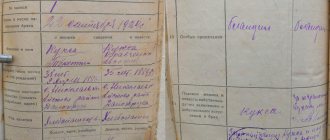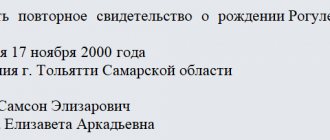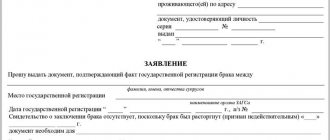The most important and solemn moment of the wedding day is the state registration of marriage in the registry office. Of course, newlyweds begin preparing for such an event long before the long-awaited wedding day.
In this regard, a huge number of questions arise that are directly related to documents. Currently, double surnames for marriage are actively becoming fashionable. In ancient times, they were assigned only to noble classes or couples who distinguished themselves by special merits.
Today, this is a simple decision that future spouses make together, based only on their personal desires and preferences. So, let's look at this issue in detail from a legislative point of view.
Whose last name is first?
In the family legislation of the Russian Federation there is no procedure for the formation of double surnames.
This means that there are no clear positions in the legislation as to whose should be first and whose should be second. Future spouses themselves choose the sequence of their surnames.
But when compiling a polysyllabic surname, the future husband and wife, as well as registry office employees, must follow the criterion of consonance.
However, employees of the registration authority do not have the right to refuse newlyweds to register the double surname they have compiled if it is inconsistent, difficult to pronounce, or composed absurdly.
What surname the spouses will bear after the wedding is up to them to decide.
Double surname for children
Is it possible to give a child a double surname if the parents have different surnames?
Unfortunately, this is prohibited in our country, since the child must have the surname of his mother and father. But even this problem can be solved.
How to give a child a double surname? To do this, the mother can submit an application to the registry office to return the maiden name, then register the child with a double surname - mother and father.
This can also be done for those children whose parents registered their marriage, but at the same time everyone remained with their own last name. If the parents wish, they can give their child a double surname both at birth and later.
However, there is also no need to delay too much, since after the child turns 14 years old, the wishes of the parents are no longer taken into account, and only the consent of their child is required to carry out this procedure.
Article 59 of the Family Code of the Russian Federation regulates this procedure as follows:
- Until the child reaches 10 years of age, the decision on choosing a surname is made by the parents;
- from 10 to 14 years - parents decide together with the guardianship authorities;
- When the child reaches 14 years of age, the child decides.
The further procedure for registering a child’s new surname is carried out in accordance with the rules that are provided for adult citizens.
So, changing your last name is a responsible step that is regulated by the Family Code of the Russian Federation.
Every citizen who wants to take a double surname must carefully weigh the pros and cons so that the decision made will have a positive impact not only on his life, but also on the lives of his heirs.
Similar articles:
- How to change data on State Services when changing your last name?
- Should I change my last name when getting married?
- Changing a child's surname without the father's consent
- Cost of state duty for changing a surname when changing a passport
- Making changes to the PTS when changing your last name
- Next entry How to change your passport with your last name after marriage?
Comments on the article “How to make yourself a double surname when getting married?”
Nobody has written anything yet. Be the first!
How can I change it some time after registering a marriage?
Often a change of surname occurs when registering a barracks.
In this regard, the newlyweds are given their first and main family document in the registration hall - a marriage certificate. It contains all the data of the spouses and, of course, the data that the husband and wife will carry in the future. Sometimes it happens that for some reason one of the persons wishing to legalize the marriage relationship refuses to change the data during the marriage and remains with his own.
But some time after the wedding, he still decides to change his last name. In this case, you need to go through a certain legal procedure.
The legislation of the Russian Federation allows you to change your personal data regardless of status and position. But the very fact of the change must be recorded by the registry office employees.
You need to collect some documents:
- passport;
- birth certificate;
- certificate of marriage or divorce.
In this case, a statement is written indicating the reason for the change in personal data, as well as the previous and new surname.
This application will be reviewed by the Civil Registry Office staff within thirty days, after which either personal data is changed or a justified refusal to carry out this action is issued. A refusal can always be appealed in court.
Dear readers! To solve your problem right now, get a free consultation
— contact the on-duty lawyer in the online chat on the right or call:
+7
— Moscow and region.
+7
— St. Petersburg and region.
8
- Other regions of the Russian Federation
You will not need to waste your time and nerves
- an experienced lawyer will take care of solving all your problems!
How does change happen?
A surname can be changed both after registration and several years after marriage.
Registration procedure
The question that the registry office employees will definitely ask before issuing the certificate will be about changing the surname: does the lady want to take her husband’s surname, make a double surname or leave her maiden name? They are guided by article of the Federal Law “On Acts of Civil Status” No. 143-FZ of November 15, 1997 (as amended on December 27, 2021). A note about this is made in the application, which the woman fills out.
If the bride suddenly changes her mind and the marriage has not yet been registered, she can contact the registry office to rectify the situation. She will be given the same form, in which she will need to cross out the previously indicated surname and write a new one on top. The registry office employee will sign and put the note “Corrected to believe.”
After
The first place a woman should go is the registry office within the limits of her registration or stay. She will be asked to fill out an application using a specific template. What documents are needed for this?
These include:
- Identification document (passport).
- 2 photographs measuring 3 by 4.
- Original marriage certificate.
- Birth certificates of children.
- Duty payment receipt.
For state registration of a name change, which includes the surname, first name and (or) patronymic, including the issuance of a certificate of name change, you will have to pay 1,600 rubles (clause 4 of Article 333.26 of the Tax Code of the Russian Federation). The fee can be paid at the post office, at the cash desk of any bank, through a terminal, bank or on the State Services portal. In some places a commission is charged for this, so it is most profitable to use the State Services portal, where a 30% discount is provided.
There are usually no difficulties with filling out the application form (Form No. 20, regulated by Order of the Ministry of Justice of the Russian Federation of October 1, 2018 No. 201), but if there are difficulties, the registry office employees will always come to the rescue. Write in legible handwriting, without blots, and be sure to indicate the reasons that prompted the change of name.
Next, the package of documents will be transferred to the Ministry of Internal Affairs, which will check whether the citizen has outstanding loan obligations to banks, alimony obligations, or court debts. A ban will be imposed on changing the surname if such deeds are found and are not repaid as quickly as possible. The verification period is 30-45 days, the results will be reported by sending a registered letter.
If the answer is positive, the woman applies to the registry office again and collects a certificate of change of name, which, in turn, is the basis for replacing the passport. This is done at the branch of the Main Directorate for Migration Issues of the Ministry of Internal Affairs of the Russian Federation (at the place of registration), or you can submit an application on the State Services portal or at the MFC.
Our experts have prepared other useful publications devoted to the nuances and rules of registering a marriage. After reading them, you can find out:
- What are the registration deadlines, what documents may be needed and where can I get married?
- Important nuances of registration with a prisoner, a foreigner, and also during pregnancy.
- At what age is it legal to get married in the Russian Federation?
- What are the conditions for marriage and 5 circumstances that prevent it.
General rules for declension of surnames in Russian
In the Russian language, there are basic rules of declension and spelling that you should know in order to express yourself correctly when difficulties arise.
You can competently address a person or mention him in a text using the following recommendations:
- standard endings, in which the declension follows the general rules, include in the masculine gender - in, - ov, -skiy, they are characteristic of Russians, as well as some East Slavic variants;
- Declension in the feminine gender and plural is determined by the rules in force for the masculine gender; most often it is subject to the norms for other parts of speech.
Most linguistic norms can be systematized by completing the words they regulate. In many cases, this is not the ending, as part of the word, but one, less often the last two letters:
- The surnames of men ending in a consonant, for example, Shevchuk, Grigoryan, Smith, Macron, are declined without taking into account the country of their owner.
- Russian names with the endings “ih” or “yh”, for example, Belykh, are not declined according to modern standards.
- If the last letter is “e”, “i”, “y”, “e”, “u” or “yu”, a single form is used in all cases, the spelling is unchanged for men and women from the Rotaru, Botticelli, Abe, Tarle families and others.
- The ending “o”, including “ko” (Martino, Petrenko) are also not a reason to change the form, even if in the native language, for example, Ukrainian, the word is declined.
- Surnames ending with the letters “a” and “ya” are declined taking into account the preceding letter and stress. With an unstressed ending, the name changes according to cases: Grusha, Grushi, Grushe, etc.
Difficult cases requiring reference to the directory include matches with geographical names, common nouns, as well as foreign origin with similar spelling to Russian. It should be remembered that linguistic norms apply to proper names, regardless of the country in which they were given.
Is it necessary to change your last name when getting married? Is it possible to keep your own?
Over the past decade, women have often left their last name after marriage. Of course, once upon a time in Rus' such a thing was out of the question. Therefore, most likely, this is the influence of European (or other) countries. For example, in Iceland there is no such thing as a woman changing her last name after marriage. In Denmark, on the contrary, a man takes his wife’s surname. Yes, of course, this also reflects the current financial and general independence of women.
Although, perhaps the reason is the reluctance to bother with documents. Let us remind you that you need to change the following documents:
- naturally, the Russian passport itself
- don't forget about your foreign passport
- of course, the indication code
- pension certificate, if any
- employment history
- and medical insurance
Changing your surname upon marriage
Diplomas, certificates and other certificates remain in your maiden name, but each time you will need to present a marriage certificate (at least a copy of it). If we talk about whether it is necessary to take the husband’s surname, then there is no such strict requirement! Therefore, if you wish, you can safely leave yours – the girl’s one.
IMPORTANT: Minors who have reached 16 years of age can undergo this procedure without written parental consent. That is, on your own.
How to change a child's last name during a divorce
- Paternity has been established. The surname of the biological father differs from that written on the certificate.
- One of the former spouses was deprived of parental rights before or after the divorce. Then the child will be able to take the surname of the remaining parent.
- One of the former spouses re-entered a marriage. The child will be able to take a common surname for the new family union.
- The child was adopted.
- The religious beliefs of one of the parents do not allow the child to keep the old surname.
- The child himself wants to change his last name.
What surnames do not decline
The change in cases does not depend on the origin of the name.
In modern language, surnames do not change according to cases.
, corresponding to the characteristics from the list:
- ending in “their” or “s”;
- having any of the paired vowels u/yu, i/s or e/e at the end of the word;
- ending in “o” or “ko”;
- having two vowels at the end, the last of which is “a”.
It is recommended to be aware of changes in writing traditions over time. Thus, surnames ending with the letter combination “their” or “s” were previously declined. The spelling “at Chernykh’s”, which is unacceptable today, was previously used in everyday life and in literary speech.










